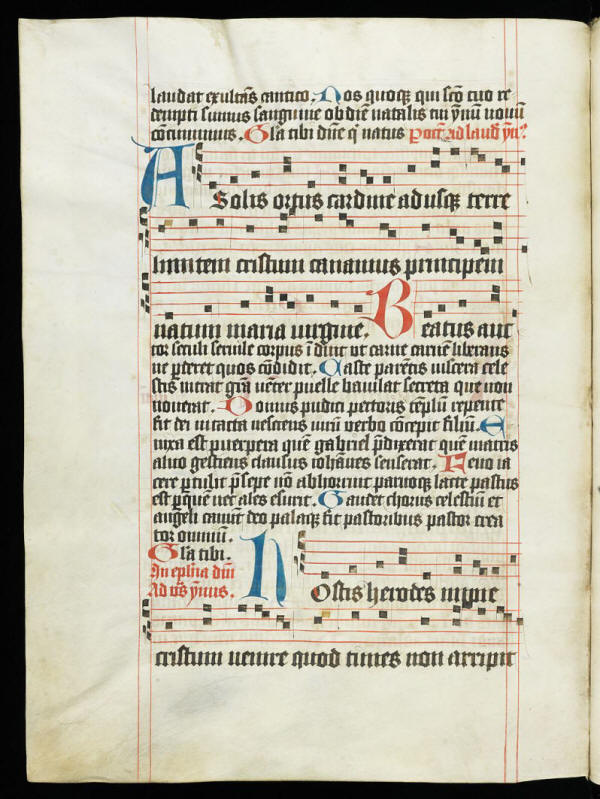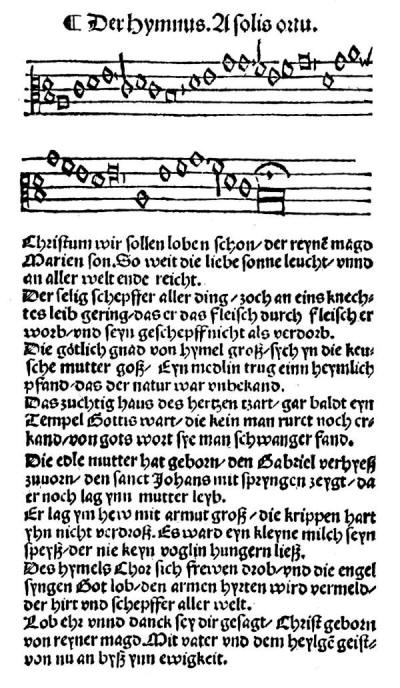A solis ortus cardine
[up]
An old hymn
(abecedarium, alphabetical
poem: 23 stanzas, iambic dimeters)
of Sedulius, ca. 450. Biographical data about the author
are non-existent.
The name (only his family-name, about his first name everything is also
hypothetical) is known from the dedicatory epistles accompanying his
Carmen Paschale (5 books, hexameters) and its prose
rendition (Opus paschale). Next to this
impressive poem (very long, but fluent) there are two hymns attributed to the
same Sedulius, the most famous and successfull our poem: A solis ortus
cardine, of which the first part (7 stanzas) was
included in the Church's liturgy of Advent.
1
A
solis ortus cardine
From the point where the sun rises
From east to west, from shore to shore,
Christum wir sollen loben schon,
Van 't vroeglicht van de dageraad
2
Beatus auctor saeculi
The blessed creator of the world
Behold, the world's Creator wears
Der selig' Schöpfer aller Ding'
De Heer die alles deed ontstaan,
3
Clausae parentis viscera
Into the womb of the chaste mother
For this how wondrously He wrought!
Die göttlich' Gnad' vom Himmel groß
Het is de schoot der reine Maagd
4
Domus pudici pectoris
The house of a chaste breast
She bowed her to the angel's word
Das züchtig' Haus des Herzens zart
Haar lichaam ongerept en kuis
5
Enixa est puerpera
The expectant woman has given birth
Die edle Mutter hat gebor'n
Hem is het die zij 't leven geeft,
6
Faeno iacere pertulit,
He endured to lie on hay,
He shrank not from the oxen's stall,
Er lag im Heu mit Armut groß,
Hij die het hele leven hoedt,
7
Gaudet chorus caelestium
The heavenly chorus rejoices
And while the angels in the sky
Des Himmels Chör' sich freuen drob,
Luid klinkt het lied van 't englenkoor :
8
Iesu, tibi sit gloria,
Jesus, glory be to you,
Lob, Ehr' und Dank sei dir gesagt,
Caedulius (ca. 450)
(strofe 1-7, or A-G) with
doxology added)
Translation
Francis Brown /span>
John Ellerton
Martin Luther
J.W. Schulte Nordholt
The first 7 stanzas (covering A-G)
tell the story
of Christmas. The remaing 'cento' from H-Z provides a kind of summary of the
gospel (a selection of stories and miracles), With at 'V' the crucifixion, 'X'
the resurrection, 'Y' the 'hymns' we sing for the risen Christ, who
destroys the 'Zealous' dragon in the final verse, where Ascension Day is also
Judgment day. Luther translated the
first part, a hymn for Christmas day: Christum wir sollen
loben schon. As you can easily see below: he stayed really close to
the original, as with his other hymn-translations.
ORIGINAL TEXT
LITTERAL TRANSLATION
METRICAL TRANSLATION
See below
with music
LUTHERS TRANSLATION (metrical)
German
text with simplified tune
DUTCH TRANSLATION (metrical)
ad usque terrae limitem
Christum canamus principem,
natum Maria virgine.
right up to the end of the world
let us sing of Christ the king
born from the virgin Mary.
Let every heart awake and sing
The holy Child Whom Mary bore,
The Christ, the everlasting King.
Der reinen Magd Marien Sohn,
Soweit die liebe Sonne leucht't
Und an aller Welt Ende reicht.
tot waar de zon weer ondergaat
zingt elk de koning Christus eer,
het kind der maagd is onze Heer.
servile corpus induit,
ut carne carnem liberans
non perderet quod condidit.
put on a slave's body
so that freeing flesh by flesh
he might not lose what he had made
The form and fashion of a slave;
Our very flesh our Maker shares,
His fallen creature, man, to save.
Zog an ein's Knechtes Leib gering,
Daß er das Fleisch durchs Fleisch erwürb'
Und sein Geschöpf nicht all's verdürb'.
Hij neemt de knechtsgestalte aan,
opdat door 't vlees Hij 't vlees bevrijdt
en wat Hij schiep behoudt en leidt.
caelestis intrat gratia;
venter puellae baiulat
secreta quae non noverat.
there enters heavenly grace;
the girl's belly bears
secrets which she does not know.
A maiden, in her lowly place,
Became, in ways beyond all thought,
The chosen vessel of His grace.
Sich in die keusche Mutter goß;
Ein Mägdlein trug ein heimlich Pfand,
Das der Natur war unbekannt.
die hemelse genade draagt
en zwelt van een geheimenis
dat voor haarzelf verborgen is.
templum repente fit Dei;
intacta nesciens virum
verbo concepit Filium.
suddenly becomes the temple of God;
she who was untouched and did not know man
conceived the Son through a word.
Declaring what the Father willed,
And suddenly the promised Lord
That pure and hallowed temple filled.
Gar bald ein Tempel Gottes ward;
Die kein Mann rühret noch erkannt,
Von Gottes Wort man schwanger fand.
wordt voor God zelf een heilig huis.
Geen man bekent zij.
Door het woord
brengt zij den Zoon des hemels voort.
quem Gabriel praedixerat,
quem matris alvo gestiens
clausus Ioannes senserat.
to him who was predicted by Gabriel,
whom John recognised and leapt for joy
when he was shut in his mother's womb.
Den Gabriel verhiess zuvorn,
Den Sankt Johann's mit Springen zeigt',
Da er noch lag im Mutterleib.
dien Gabriel verkondigd heeft,
en wien de Doper hulde bood,
opspringend in zijn moeders schoot.
praesepe non abhorruit,
parvoque lacte pastus est
per quem nec ales esurit.
he did not shrink from the crib,
he was fed on a little milk
- he who does not allow even a bird to go hungry.
He lay within the manger bed,
And He whose bounty feedeth all
At Mary's breast Himself was fed.
Die Krippe hart ihn nicht verdroß;
Es ward ein' kleine Milch sein' Speis',
Der nie kein Vöglein hungern liess.
die ook de kleinste vogel voedt,
ligt hier in 't stro, Hij 's hemels vorst!
Hier drinkt Hij aan zijn moeders borst.
et angeli canunt Deum,
palamque fit pastoribus
pastor, creator omnium.
and the angels sing of God,
there is revealed to shepherds
the Shepherd, who is the creator of the universe.
Sang praise above the silent field,
To shepherds poor the Lord Most High,
The one great Shepherd, was revealed.
Und die Engel singen Gott Lob;
Den armen Hirten wird vermeld't
Der Hirt und Schöpfer aller Welt.
Ere zij God, de hemel door.
Aan herders wijst het in een stal
den groten Herder van 't heelal.
qui natus es de virgine,
cum Patre et almo Spiritu,
in sempiterna saecula.
Amen.
who were born from the virgin.
together with the Father and the lifegiving Spirit
through everlasting ages.
Amen
Christ, gebor'n von der reinen Magd,
Mit Vater und dem Heil'gen Geist
Von nun an bis in Ewigkeit!
Paean Alphabeticus de Christo
(source: Bach cantatas website)
(Church Hymns, 1871)
(Enchiridion 1524)
(Hymnen, 1967)
The original tune (from a antiphonarium, Skt. Gallen,

The german version (with altered tune by Luther (Walter?), to make it suitable for community hymn singing)

The english version with notes (tune a solis ortus) - Lutheran hymnal
